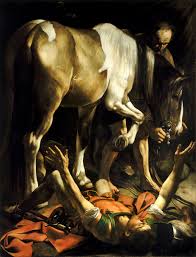“What is this you have done?”
Devra Torres | Jan 31, 2016

On last week's feast day of the conversion of St. Paul, I noticed something odd--or not so odd. He's blinded by a sudden light, and he hears a mysterious Voice from heaven. And the Voice says, "Thou shalt stop persecuting me."
Or so we might have expected. But no: it says,"Saul, Saul, why do you persecute me?"
In other words, even in the most spectacular of conversion experiences, God doesn't use force, doesn't order people around. He, the Creator and Lawgiver, has that "right," but He chooses not to exercise it.
Of course, the "Thou shalt not's" are also straight from His mouth, written by His own hand on the stone tablets: Good is good and evil is evil. A commandment is a commandment. The guideposts are clear.
But the invitation to conversion is just that--an invitation. Even when it's intense and unmistakeable, it all starts with an invitation to Saul to explain his own conduct. Why have you performed this action? Why have you freely chosen to do this?
And also: Why are you acting this way towards me? Not only is it a chance to face his own decisions, it's placed in the context of an interpersonal relationship with the Speaker. Saul is called by name, and twice, and asked (without orders or threats, just asked) to render an account of his treatment of another Person.
But doesn't this emphasis on invitations seem to water down God's authority? Isn't it a mealy-mouthed attempt to avoid straight talk about good and evil? Well, if you've ever been on the receiving end of an invitation like this--a chance to freely explain your own choices and deeds--you'll see that the prospect is plenty alarming.
In fact, it's no less alarming than a command, a direct order. If somebody arbitrarily forces you to do something, you can rail against it; you can let it be known that you're doing it against your will. You bear no responsibility, since the decision has been taken out of your hands. If someone tries to blame you, you might get mad, but you have reason and justice on your side. You can retort: "Hey, it wasn't my idea!"
But when you're forced to face your own self, and your own deeds, you're on the spot.

So maybe commandments are Old-Covenant-style governance and invitations New-Covenant-style? No, that doesn't fly: we see the Invitation way back in the Garden of Eden. God invites Adam, then Eve, to explain themselves: "What is this you have done?" This is so alarming that they, who dared to disobey an all-powerful Creator in the first place, can't muster enough courage to give Him a straight answer. They're not only shifting blame--initiating a now-familiar pattern for husband-wife communication--they're also avoiding the question. As Katie put it three years ago, "Our decisions belong to us." Adam, Eve, and Saul were free to make their decisions, free to defend them, and of course free to suffer their consequences. And free to accept the invitation of help, or to reject it.
And we're all alarmingly free to do the same.
